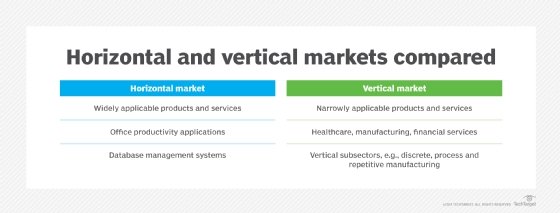vertical cloud
What is a vertical cloud?
A vertical cloud, also known as an industry cloud platform, is a set of cloud computing services optimized for use in a particular industry or for a specific business model.
Unlike organizations who can make do with general-purpose cloud computing services, those within certain industries or vertical markets often have more niche IT requirements around security, compliance and other factors. Vertical cloud computing providers aim to offer services that help their customers meet these unique requirements.
For example, healthcare organizations need to ensure data privacy in accordance with the Health Insurance Portability and Accountability Act (HIPAA). As a result, organizations in this vertical might prefer a cloud provider that offers HIPAA-compliant services, as well as features for electronic medical records and other applications unique to their industry.
Examples of vertical industries
Industries that might employ vertical cloud computing services include the following:
- Financial services.
- Healthcare.
- Manufacturing.
- Education.
- Life sciences.
- Government.
- Utilities.
- Oil and gas.

Benefits and challenges of vertical clouds
Cloud computing, in general, offers numerous benefits, such as increased scalability and on-demand access to resources. Cloud services also reduce the need for organizations to invest in on-premises software and hardware and offer a flexible, pay-as-you-go pricing model. However, these offers are generalized and meant to fit most enterprises.
Vertical clouds deliver these same benefits, as well as industry-specific features and services. Additionally, because some vertical cloud providers focus only on one specific industry, they can offer support services that are tailored to users' needs. Top benefits of industry cloud platforms include the following:
- Improved efficiency. Industry-specific tools and workflows enable organizations to streamline processes and operations, which increases efficiency. Enterprises can better achieve business goals and innovation.
- Specialized security. Industry cloud platforms often provide customized, built-in security protocols, which reduce the risk of data breaches and ensure data privacy.
- Increased compliance. Different industries must follow different regulations. Vertical cloud offerings are familiar with such compliance requirements and help enterprises adhere to industry regulations and standards.
However, industry cloud platforms are not beneficial for all enterprises. Drawback can include the following:
- High costs. With more specialized services, industry cloud platforms may cost more than generic public cloud offerings.
- Vendor lock-in. Once an enterprise chooses a provider's platform, it is difficult to move to a different provider to access better services or costs.
Examples of vertical cloud services
While many vertical cloud services tend to fall under the category of software as a service, they can also be platform-as-a-service and infrastructure-as-a-service offerings.
There is a growing number of smaller, or more specialized, vendors in the vertical cloud market, but some of the major public cloud providers also offer industry-specific services. For example, AWS GovCloud is a service that offers an isolated AWS cloud region specifically for U.S. government agencies that have sensitive workloads and strict regulatory requirements. Also, Microsoft Cloud for Manufacturing is a service that offers tools to create a resilient supply chain, as well as helps to fold internet of things and artificial intelligence into production processes.







